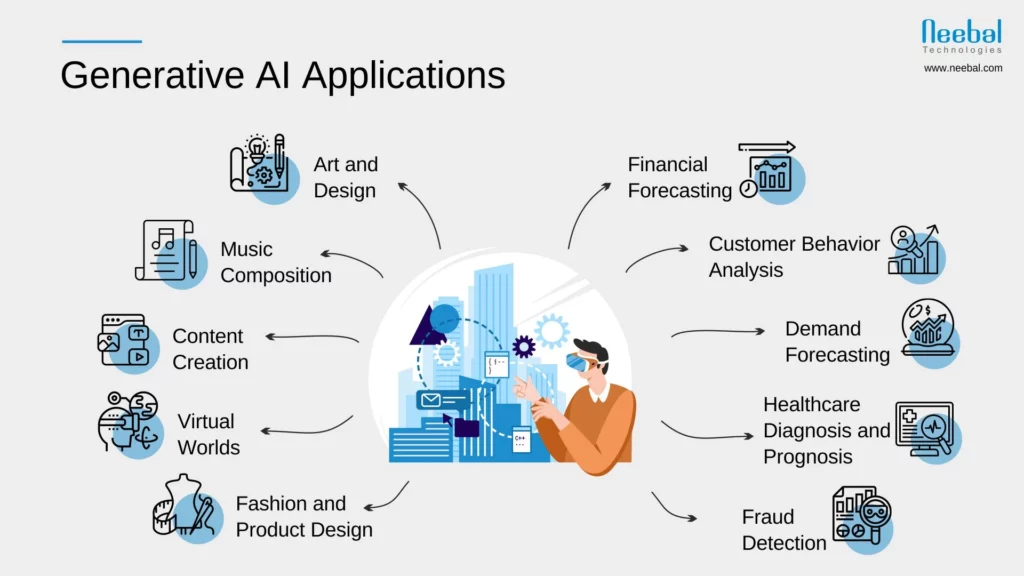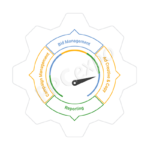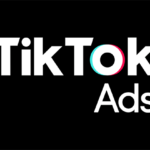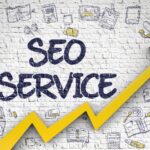As we step into 2024, the B2B marketing landscape in ASEAN is undergoing a transformative shift, driven by rapid digitalization and evolving market dynamics. In this era of constant change, understanding and adapting to the latest digital marketing trends is not just beneficial—it’s essential for business success. This blog delves into eight pivotal trends that are shaping the future of B2B marketing in the region.
From the growing influence of influencer marketing to the nuanced art of social listening, these trends highlight the innovative strategies that marketers must embrace. As ASEAN continues to emerge as a vibrant economic hub, these trends offer a roadmap for B2B marketers looking to navigate this dynamic and competitive environment effectively.
1. Continued Influencer Marketing Growth in B2B
Once only a B2C phenomenon, influencer marketing is now a cornerstone in the B2B arena, with significant implications for ASEAN markets in 2024.
The shift towards influencer marketing in B2B is backed by compelling statistics. According to recent findings, three-quarters of B2B marketers are currently leveraging influencers, and an impressive 93% of Chief Marketing Officers (CMOs) plan to increase their use of influencers. This surge is not without reason. In a digital landscape where traditional advertising often falls short in authenticity and engagement, influencers bridge the gap by offering credible, third-party endorsements. They have the unique ability to humanize brands, making complex B2B products and services more relatable and understandable to potential customers.
Influencers in the B2B space, often industry experts or thought leaders, bring a level of trust and authority that is hard to replicate through conventional marketing channels. Their endorsements are seen as more genuine and are often perceived as peer recommendations rather than paid promotions. This is particularly effective in ASEAN, where business relationships are deeply rooted in trust and credibility.
Moreover, the nature of B2B influencer marketing is evolving. It’s not just about having a high-profile industry figure endorse a product; it’s about creating meaningful, content-driven partnerships. These influencers are often involved in co-creating content that is educational, insightful, and adds real value to the audience. This approach aligns well with the decision-making process in B2B transactions, which is typically longer and involves more research and validation compared to B2C.
The impact of influencer marketing in B2B is also evident in the way purchasing decisions are made. With B2B buyers spending about two-thirds of their purchasing journey engaging with digital content, influencers become a critical touchpoint. They provide the much-needed third-party validation and can significantly influence the buyer’s journey, from awareness to decision-making.
As we move further into 2024, ASEAN businesses embracing influencer marketing in their B2B strategies are likely to see enhanced engagement, stronger brand credibility, and ultimately, a more effective path to reaching and persuading their target audiences.
2. B2B Sales are Increasingly Hybrid
B2B sales is moving towards a hybrid model that blends online and offline interactions.
Statistics reveal that B2B buyers now spend approximately two-thirds of their purchasing journey in digital spaces, engaging through self-service platforms or remote interactions. However, the remaining one-third of the journey still involves traditional channels like direct meetings and physical mail. This blend of digital and physical touchpoints reflects a deeper change in customer behaviors and preferences, emphasizing the need for a more flexible and adaptive sales approach.
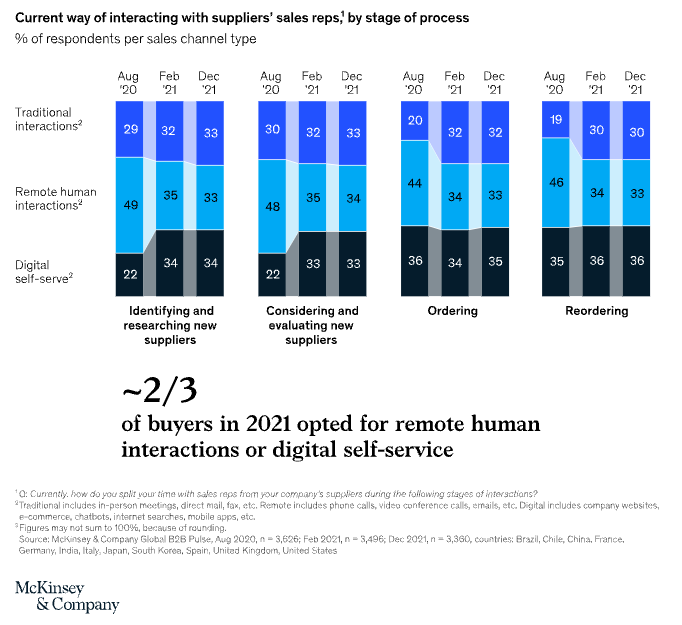
The hybrid model in B2B sales is not just a response to changing customer preferences but also a strategic move to optimize reach and efficiency. By combining the convenience and scalability of digital channels with the personal touch of offline interactions, businesses can create a more comprehensive and effective sales strategy. This approach allows for greater personalization, as sales teams can use digital insights to tailor their in-person interactions, making them more relevant and impactful.
In ASEAN, where diverse markets and varying levels of digital maturity exist, the hybrid model offers a particularly potent solution. It allows businesses to cater to the digital-savvy while also accommodating those who value traditional business practices. As we progress through 2024, the hybrid sales model is set to become a staple in B2B strategies, offering a balanced path to customer engagement and sales success.
3. Engaging the Dark Funnel of B2B Marketing
The idea of the dark funnel, gaining traction in the marketing world, refers to the customer journey stages that are not directly observable or trackable through traditional analytics.
The dark funnel includes activities like word-of-mouth recommendations, social media interactions, community engagements, and other informal touchpoints that influence buyer decisions but are often overlooked due to their intangible nature – things you won’t find in your reporting dashboard.
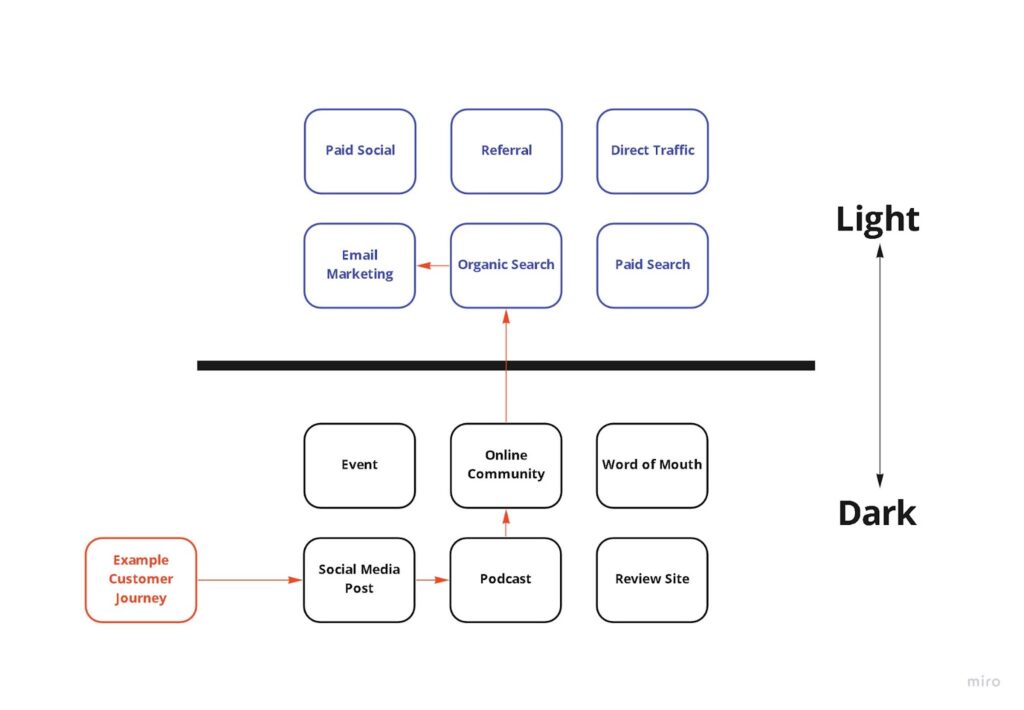
The dark funnel challenges the conventional marketing approach that relies on measurable metrics and clear-cut attribution paths. In the B2B context, where decision-making processes are complex and multifaceted, understanding and leveraging the dark funnel becomes crucial. It represents the unseen part of the buyer’s journey, where significant decisions and opinions are formed outside the scope of standard tracking tools.
Engaging with the dark funnel effectively requires a shift in mindset. Marketers need to move beyond the comfort zone of quantifiable metrics and delve into the qualitative aspects of customer engagement. This involves actively participating in online communities, creating valuable content for organic social media, and fostering word-of-mouth through exceptional customer experiences. Podcasts and PR efforts also play a significant role in this arena, offering platforms for thought leadership and brand visibility that indirectly influence B2B buyers.
The key to navigating the dark funnel is to focus on building brand awareness, trust, and affinity in spaces where potential customers are making critical decisions. This approach is not about direct lead generation but about creating a brand presence that resonates with the audience, thereby indirectly driving demand and conversions. By understanding and engaging with the dark funnel, B2B marketers can tap into a deeper level of customer insights, leading to more effective and holistic marketing strategies in the ASEAN region.
4. Enhancing Personalization with AI
With 93% of B2B executives planning to increase their investment in generative AI, the focus is on delivering highly tailored experiences to customers. AI’s advanced analytics and machine learning capabilities enable marketers to understand customer preferences and behaviors in unprecedented depth.
This technology facilitates the creation of customized content, product recommendations, and communication strategies, significantly enhancing customer engagement and satisfaction. By leveraging AI, B2B marketers can offer more relevant, individualized interactions, setting the stage for stronger, long-lasting business relationships.
5. An Increased Focus on Marketing Efficiency
In 2024, B2B marketing in ASEAN is increasingly focused on efficiency, driven by tighter budgets and the need for higher ROI. With 61% of marketers finding their martech stacks overly complex, there’s a push towards streamlining tools and processes.
This trend involves adopting more integrated and automated marketing solutions that reduce manual effort and optimize resource allocation. Marketers are also adopting data-driven strategies to identify and focus on high-impact activities, ensuring that every marketing dollar is spent effectively. It’s not just about cutting costs but about smarter, more strategic marketing that delivers better results with fewer resources.
6. ESG as a Catalyst for Value Creation
In 2024, Environmental, Social, and Governance (ESG) considerations are increasingly central in B2B marketing strategies, particularly in ASEAN. With 46% of B2B decision-makers acknowledging the growing importance of ESG in procurement decisions, businesses are integrating these principles into their core operations and marketing narratives.
ESG-focused marketing not only addresses regulatory compliance and risk management but also resonates with the values of modern consumers and partners. By proactively showcasing their commitment to sustainability, social responsibility, and ethical governance, companies are enhancing their brand reputation, fostering trust, and creating long-term value that goes beyond immediate financial gains.
7. Leveraging Real-Time Consumer Insights Through Social Listening
In 2024, social listening becomes a crucial tool for B2B marketers in ASEAN. With the vast majority of brand-related discussions happening outside controlled channels, social listening provides real-time insights into consumer preferences and market trends. This approach enables marketers to understand and respond to the evolving needs of their audience, tailor their messaging, and stay ahead of the competition. By proactively monitoring social conversations, businesses can make data-driven decisions, enhance customer engagement, and ultimately drive more effective marketing strategies.
8. Tapping into Growing Online Communities
The rise of niche online communities is a significant trend in 2024’s B2B marketing landscape. In ASEAN, where digital communities are flourishing, brands that engage with these groups can foster deeper consumer relationships. By actively participating in relevant online forums and discussions, businesses gain valuable insights into consumer needs and preferences.
This engagement not only boosts brand awareness and loyalty but also allows companies to tailor their offerings and marketing messages to meet the specific demands of their target audience, enhancing the effectiveness of their marketing efforts.
9. Creative Short-Form Content to Capture Attention
In 2024, the attention span of consumers continues to shrink, making creative short-form content a vital trend in B2B marketing. ASEAN marketers are leveraging platforms like Instagram Reels and TikTok to deliver concise, impactful messages that quickly capture and retain audience attention. This content format, known for its high engagement rates, is particularly effective in conveying brand stories, showcasing products, and driving brand awareness in a crowded digital landscape.
By adopting short-form content strategies, B2B marketers can effectively engage their audience and stand out in the competitive market.
Navigate Marking in 2024 with Confidence
As we navigate through the dynamic landscape of B2B marketing in ASEAN in 2024, it’s clear that staying ahead requires agility, innovation, and a deep understanding of emerging trends. From leveraging AI for personalized experiences to embracing ESG principles, the way businesses approach marketing is fundamentally changing. Engaging with the dark funnel, tapping into online communities, and creating impactful short-form content are no longer optional but essential strategies for success. However, navigating these trends can be challenging, especially when resources are limited or expertise is lacking.
If you’re finding it difficult to keep pace with these evolving trends or to effectively integrate them into your marketing strategy, consider partnering with a Singapore digital marketing agency focused on B2B. An experienced agency can provide the insights, tools, and expertise necessary to navigate the complexities of B2B marketing in 2024, ensuring that your business not only keeps up with the competition but stands out in the market. Don’t let the rapid changes in the marketing landscape hold you back. Reach out to our team if you want some help making the most of 2024.

